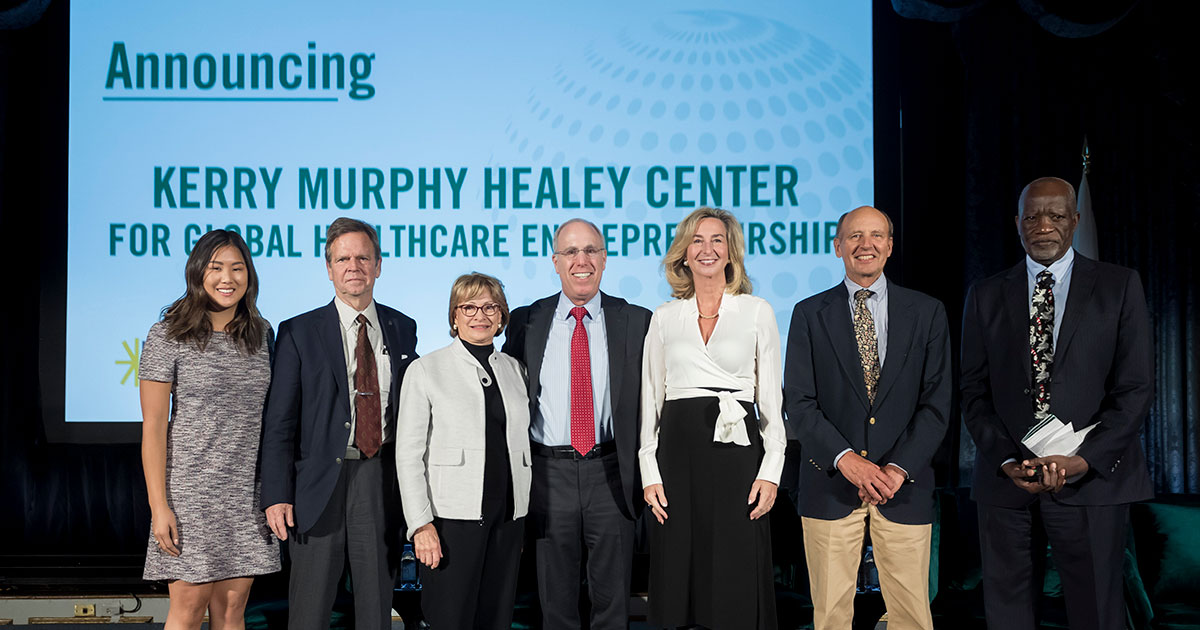Babson to Establish a New Center Focused on Global Healthcare Entrepreneurship

Where you live shouldn’t determine if you live.
In medicine today, however, your location can have a major impact on the affordability and accessibility of the care you receive. If you are fortunate to need medical care in a prosperous city in the United States, you probably don’t have to travel far to find a doctor or a hospital.
In much of the developing world, though, having access to care isn’t so easy. Doctors may be expensive and hard to find, and they may work in facilities lacking in necessities such as reliable electricity and clean water.
To address these fundamental issues of access and infrastructure that plague medical care around the world, Babson is establishing the new Kerry Murphy Healey Center for Global Healthcare Entrepreneurship.
The center’s creation is thanks to $10 million in lifetime giving to Babson from Carmella Kletjian. “My hope is that the new center will succeed in bringing two disciplines together, medicine and entrepreneurship, and teach present and future generations the skills that will help improve healthcare in challenging areas,” says Kletjian, co-founder of the Steven C. and Carmella R. Kletjian Foundation, which strives to improve the safety, affordability, and quality of surgery in the world’s poorest places.
Kletjian, also a member of the Babson Board of Trustees, is a believer in the entrepreneurial mindset of Babson and feels it has the potential to bring fresh ideas and unconventional solutions to areas with low medical resources. Says Kletjian, “Entrepreneurial Thought and Action® encourages students to think outside of the box, and they will learn how to apply that thinking to the practice, delivery, and business of medicine.”
The Basics of Care
Named in honor of Babson’s 13th president, Kerry Healey, who stepped down as the College’s leader in June, the new center confronts a hard truth of medicine—despite the many, many advances that humanity has seen in health care, there are still far too many people who are living without basic care.
Modern medicine knows how to treat many diseases. The issue now is how to bring those treatments to everyone who needs them. According to The Lancet Commission on Global Surgery, for instance, a staggering 5 billion people do not have access to safe and affordable surgical care.
To make an impact on the ground in developing countries, the center will focus on research but also much more. Among other initiatives, it will work with local entrepreneurs who are addressing health concerns though their ventures, and it will collaborate with eminent physicians and institutions on seeking answers to issues of medical access.
The goal is to bring the power of entrepreneurial thinking and business know-how to global medicine. “The power of Babson is its ability to create business ecosystems around global health problems,” says Dr. Mack Cheney, co-founder of the Kletjian Foundation, who has spent 30 years delivering care in developing countries such as Guatemala, Haiti, Ecuador, and Kenya. “Currently, the lack of those systems is negatively impacting 80 percent of the world’s population.”
Medicine Meets Entrepreneurship
The Kletjian Foundation has made a significant investment in Babson in recent years. It not only has established an endowed professor position, but it also funded the Schlesinger Fund for Global Healthcare Entrepreneurship. Named for Babson’s 12th president, Len Schlesinger, that fund is a multifaceted initiative focusing on research, student programs, and educational activities.
“Carmella Kletjian and her foundation are empowering Babson to have impact in an area of critical global need, and we are grateful for their tremendous support,” says the College’s current president, Stephen Spinelli Jr. MBA’92, PhD.
At first blush, though, some may question why a business school would become involved in solving healthcare challenges. Spinelli counters that entrepreneurship is essential. “Global health is an area primed for disruption and ready to benefit from the ideas, impact, and value that entrepreneurial leaders create,” he says. “By applying Babson’s proven entrepreneurial approach to global health challenges, we can make great strides in ensuring that all people have access to safe, sustainable, and high-quality medical care.”
Posted in Community




